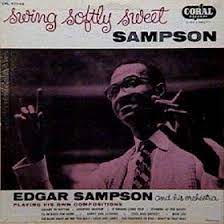
Daily Dose Of Jazz…
Edgar Melvin Sampson was born on October 31, 1907 in New York City, New York. He began playing violin aged six and picked up the saxophone in high school, then started his professional career in 1924 in a violin piano duo with Joe Colman. Through the rest of the 1920s and early 1930s, he played with many big bands, including those of Charlie “Fess” Johnson, Duke Ellington, Rex Stewart and Fletcher Henderson.
In 1934, Sampson joined the Chick Webb outfit and during his period he created his most enduring work as a composer, writing Stompin’ at the Savoy and Don’t Be That Way. Leaving Webb in 1936, his reputation as a composer and arranger led to freelance work with Benny Goodman, Artie Shaw, Red Norvo, Teddy Hill, Teddy Wilson and Webb.
Becoming a student of the Schillinger System in the early 1940s, Edgar continued to play saxophone through the late 1940s and started his own band at the end of the decade. He worked with Latin performers such as Marcelino Guerra, Tito Rodríguez and Tito Puente as an arranger.
He recorded one album under his own name, Swing Softly Sweet Sampson, in 1956. Due to illness, he stopped working in the late Sixties. Composer, arranger, saxophonist, and violinist Edgar Sampson, nicknamed The Lamb, transitioned on January 16, 1973.
More Posts: arranger,bandleader,composer,history,instrumental,jazz,music,saxophone,violin
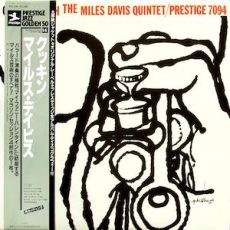
Requisites
Cookin’ With The Miles Davis Quintet ~ The Miles Davis Quintet | By Eddie Carter
This morning’s choice from the library is the first of four albums Miles Davis recorded to complete his contract obligations with Prestige before moving on to Columbia Records. It took only two days for all four to be made but resulted in Relaxin’ (1958), Workin’ (1959), Steamin’ (1961), and Cookin’ With The Miles Davis Quintet (Prestige PRLP 7094), released in 1957. The group consists of Miles Davis (track: A1) on muted trumpet, (tracks: A2, B1, B2) on trumpet, John Coltrane (tracks: A2, B1, B2) on tenor sax, Red Garland on piano, Paul Chambers on bass, and Philly Joe Jones on drums. My copy used in this report is the 1984 Prestige Jazz Golden 50 Series Japanese Mono reissue (Prestige SMJ-6534M) by Victor Musical Industries, Inc.
Side One begins with the date’s only quartet performance, a gorgeous rendition of My Funny Valentine by Richard Rodgers and Lorenz Hart. Red introduces the standard with a brief introduction, segueing into the trumpeter’s sublimely beautiful, muted melody over the rhythm section’s soft accompaniment. Miles then expresses his thoughts and feelings in a heartwarming performance. Red comes in with a compelling interpretation preceding the trumpet’s sensual beauty at the end. The quintet picks up the pace for an original by Miles, affording everyone solo space, Blues By Five. The trio introduces this tune with an infectious groove. Davis steps up first for a vivacious opening solo, next Coltrane follows with a swinging statement. Garland creates a mood of cheerfulness in the third reading, then Chambers makes a strong impression next. Philly shares an intriguing conversation with Garland who leads the trio to the finish line.
Side Two starts at a fast clip with a speedy rendition of Airegin by Sonny Rollins. John opens with a lively introduction that sets the tone for the ensemble’s vigorous melody. Miles kicks off the solos with fierce intensity, then John fuels the second statement with plenty of heat into the ensemble’s return for the reprise and abrupt stop. Tune-Up by Miles Davis opens with a brisk introduction by Philly ahead of the quintet’s spirited melody. Davis is captivating from the opening notes of his exhilarating reading. Coltrane comes next and surges upward toward the stratosphere. Garland gets a brief moment to shine, then Miles and Philly have a short exchange into the close. The quintet wraps the album with When Lights Are Low by Benny Carter and Spencer Williams. The solo order is Miles, Coltrane, and Garland. All three take their readings at a leisurely pace leading to the group’s exit and a brief word from Miles.
Bob Weinstock supervised the original session of Cookin’ With The Miles Davis Quintet, and Rudy Van Gelder was the recording engineer. The remastering of his tapes by Victor Musical Industries is outstanding, and this reissue is a sonic treat. The sound is spacious, natural, and well-balanced. The vinyl is dead silent until the music starts and each track on this album and its companions were all done in just one take. If you’ve listened to or own any of the other three records in this series, get ready to like Cookin’ With The Miles Davis Quintet just as much. I highly recommend this album to anyone who loves jazz and is a fan of Miles Davis’s work during the fifties. This version of the quintet lasted just two years, but they made an indelible impression by creating music that can be played repeatedly and enjoyed endlessly!
~ Relaxin’ With The Miles Davis Quintet (Prestige PRLP 7129), Steamin’ With The Miles Davis Quintet (Prestige PRLP 7200), Workin’ With The Miles Davis Quintet (Prestige PRLP 7166) – Source: Discogs.com ~ My Funny Valentine – Source: JazzStandards.com © 2022 by Edward Thomas Carter
More Posts: choice,classic,collectible,collector,history,instrumental,jazz,music,trumpet
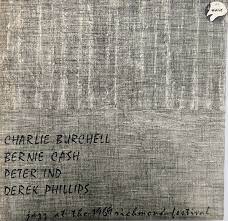
Daily Dose Of Jazz…
Charles Burchell was born in London, England on October 30, 1925 and began learning the ukulele, then guitar. Then he heard an Artie Shaw record that inspired him to take up the clarinet and play jazz. Switching to alto saxophone, he started his own quintet in 1943, then tried tenor saxophone before he was drafted into the Royal Air Force. Transferred to the army in 1944, he played in Greece with the British Divisional Band.
Following his discharge in 1947 Charles worked in London with the Toni Antone Big Band. By 1949 he had given up full-time musicianship for work in a factory in order to not perform music he did not like in order to make a living.
A disciple of Lennie Tristano and a devoted admirer of Warne Marsh, he continued to play part-time, leading his own quintet for more than 20 years. Burchell has guested with Clark Terry, Emily Remler and Nathan Davis, and recording for Peter Ind’s Wave label. He played with Ind in the group that supported Tristano on his only UK concert, at Harrogate in 1968.
Saxophonist Charles Burchell, who went by Chas and has been touted as one of the great unsung heroes of British jazz, transitioned from a heart attack on June 3, 1986.
More Posts: bandleader,history,instrumental,jazz,music,saxophone
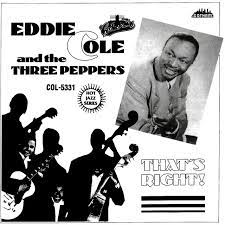
Daily Dose Of Jazz…
Edward Bennett Coles was born October 29, 1910 in Montgomery, Alabama and was the second oldest of ten children and the oldest son. He studied both piano and bass from a young age and formed his first band at age 17. Three years later at age 20, he joined Noble Sissle’s band the Sizzling Syncopators, stayed there six years and performed with greats such as Sidney Bechet and Clarence Brereton.
After a tour of Europe in 1936, Cole left Sissle’s band to join his brother Nat’s group, the Rogues of Rhythm. He appeared in the TV show Bourbon Street Beat in 1959 and later appeared on The Law and Mr. Jones and The Jack Benny Program.
Retiring in the 1960s, bassist, pianist and vocalist Eddie Cole, who was a member of the Cole dynasty of Nat, Freddy and Ike, transitioned on June 18, 1970 at the age of 59 in Los Angeles, California.
More Posts: bandleader,bass,history,instrumental,jazz,music,piano,vocal
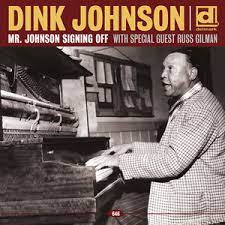
Daily Dose Of Jazz…
Ollie “Dink” Johnson was born in Biloxi, Mississippi on October 28, 1892. He was the younger brother of double bassist William Manuel “Bill” Johnson. He worked around Mississippi and New Orleans before moving to the western United States in the early 1910s. He played around Nevada and California, often with his older brother. He played with the Original Creole Orchestra, mostly on drums.
He made his first recordings in 1922 on clarinet with Kid Ory’s Band. He made more recordings in the 1940s and 1950s, mostly on piano, although Johnson recorded some one-man band sessions, playing all three of his instruments by over-dubbing.
His piano style was influenced by his brother-in-law Jelly Roll Morton, and his clarinet playing by Larry Shields. The tunes he wrote included The Krooked Blues, recorded by King Oliver and So Different Blues.
Pianist, clarinetist, and drummer Dink Johnson, who played in the Dixieland genre, transitioned in Portland, Oregon on November 29, 1954.
More Posts: bandleader,clarinet,drums,history,instrumental,jazz,music,piano



